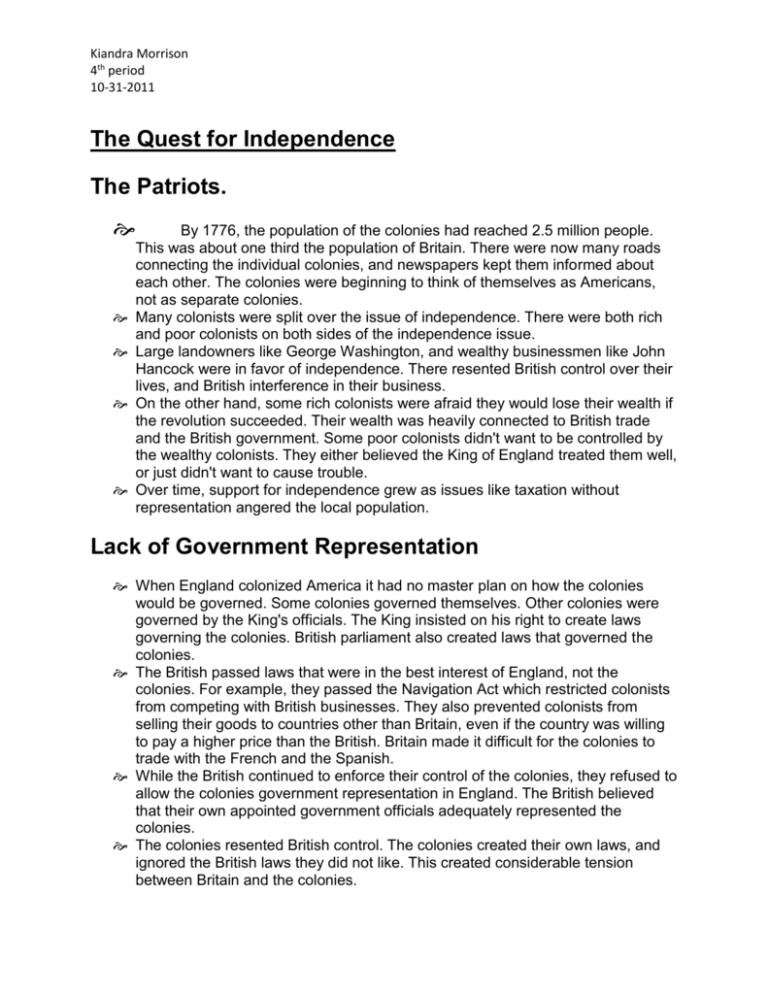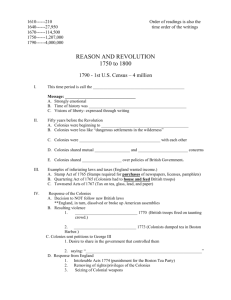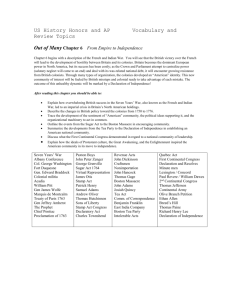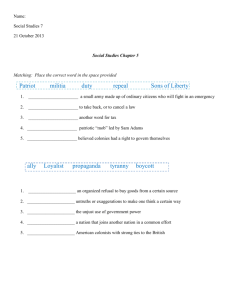The Quest for Independence
advertisement

Kiandra Morrison 4th period 10-31-2011 The Quest for Independence The Patriots. By 1776, the population of the colonies had reached 2.5 million people. This was about one third the population of Britain. There were now many roads connecting the individual colonies, and newspapers kept them informed about each other. The colonies were beginning to think of themselves as Americans, not as separate colonies. Many colonists were split over the issue of independence. There were both rich and poor colonists on both sides of the independence issue. Large landowners like George Washington, and wealthy businessmen like John Hancock were in favor of independence. There resented British control over their lives, and British interference in their business. On the other hand, some rich colonists were afraid they would lose their wealth if the revolution succeeded. Their wealth was heavily connected to British trade and the British government. Some poor colonists didn't want to be controlled by the wealthy colonists. They either believed the King of England treated them well, or just didn't want to cause trouble. Over time, support for independence grew as issues like taxation without representation angered the local population. Lack of Government Representation When England colonized America it had no master plan on how the colonies would be governed. Some colonies governed themselves. Other colonies were governed by the King's officials. The King insisted on his right to create laws governing the colonies. British parliament also created laws that governed the colonies. The British passed laws that were in the best interest of England, not the colonies. For example, they passed the Navigation Act which restricted colonists from competing with British businesses. They also prevented colonists from selling their goods to countries other than Britain, even if the country was willing to pay a higher price than the British. Britain made it difficult for the colonies to trade with the French and the Spanish. While the British continued to enforce their control of the colonies, they refused to allow the colonies government representation in England. The British believed that their own appointed government officials adequately represented the colonies. The colonies resented British control. The colonies created their own laws, and ignored the British laws they did not like. This created considerable tension between Britain and the colonies. Kiandra Morrison 4th period 10-31-2011 Taxation While England found governing its colonies in America difficult, it also found it expensive. Britain had recently fought the French and Indian war, which gave it control of Canada and much of the land east of the Mississippi. The war was very expensive for England, and it now needed more money to maintain soldiers in all these areas. In 1764, the British government decided to tax the colonists to pay a share of the costs. The British taxed all sugar bought from the French or Spanish. The British then created the Stamp Act, requiring all newspapers and legal documents to carry a stamp purchased from the British. These taxes angered the colonists and they managed to force the British to eliminate the Stamp Act and to reduce the taxes on sugar. The Townsend Act In 1767, the British passed new taxes on glass, paper, teas, paints and other goods shipped to the colonies from Britain. Prime Minister Charles Townsend wanted to raise money to cover the cost for defending the colonies, and pay the salaries of governors and judges in the colonies. These were known as the Townsend Acts. The colonists reacted by refusing to buy British goods. The colonists argued that they shouldn't be taxed since they had no representation in the British government. The colonists rallied behind the phrase, "No Taxation without Representation." Again Britain was forced to remove the taxes, all except for the tax on tea. The Boston Tea Party Events Leading to the Tea Party The British East India Company had controlled all tea trading between India and the British colonies. As a result of the tea tax, the colonies refused to buy the British tea. Instead, they smuggled tea in from Holland. This left the British East India Company with warehouses full of unsold tea, and the company was in danger of going out of business. Kiandra Morrison 4th period 10-31-2011 The British government was determined to prevent the British East India Company from going out of business. It was going to force the colonists to buy their tea. In May 1773, Prime Minister North and the British parliament passed the Tea Act. The Tea Act allowed the British East India Company to sell tea directly to the colonists, bypassing the colonial wholesale merchants. This allowed the company to sell their tea cheaper than the colonial merchants who were selling smuggled tea from Holland. This act revived the colonial issue of taxation without representation. The colonies once again demanded that the British government remove the tax on tea. In addition, the dockworkers began refusing to unload the tea from ships. The Governor of Massachusetts demanded that the tea be unloaded. He also demanded that the people pay the taxes and duty on tea. The "Boston Tea Party" On the evening of December 16, 1773, a group of men calling themselves the "Sons of Liberty" went to the Boston Harbor. The men were dressed as Mohawk Indians. They boarded three British ships, the Beaver, the Eleanor and the Dartmouth, and dumped forty-five tons of tea into the Boston Harbor. Declaration of Independence The Declaration of Independence was approved at the Second Constitutional Congress. The Declaration of Independence introduced a fundamental change in the view of government. Thomas Jefferson declared that governments were created to serve the people, and could only act with consent of the people. It created the democratic government. Thomas Paine's Common Sense On January 10, 1776, Thomas Paine published a booklet called Common Sense. In the booklet, he described his vision of a government in which the people, through their elected representatives, would have supreme power. He was the first to openly suggest independence from Britain. The booklet was broadly circulated, and even George Washington read it. Kiandra Morrison 4th period 10-31-2011 Thomas Paine's booklet would have a major influence on Thomas Jefferson in his writing of the Declaration of Independence. Meeting of the Continental Congress The Continental Congress held the Virginia Convention in May, 1776. Richard Henry Lee introduced a resolution for the colonies to become free and independent states. The Congress appointed a committee to draft the formal declaration of independence. The committee included Thomas Jefferson, Ben Franklin, John Adams, Robert Livingston and Roger Sherman. This committee then chose Thomas Jefferson to write the first draft. Signing of the Declaration of Independence The Declaration of Independence was written by Thomas Jefferson, with the assistance of John Adams and Benjamin Franklin. The document defined the rights of the people of the independent states. On July 2, 1776, the members of the Second Continental Congress voted in favor of independence. The delegates then held a second vote and approved the Declaration of Independence. John Hancock, President of the Congress and Charles Thomson, the secretary, signed the document. July 4, 1776 is officially recognized as the birth of America. The Declaration of Independence introduced a fundamental change in the view of government. Thomas Jefferson declared that governments were created to serve the people, and could only act with consent of the people. It created the democratic government. The declaration consisted of two parts. The preamble describes the people’s rights and it states that “all Men are created equal" and have the God-given right to "Life, Liberty, and the Pursuit of Happiness." The second part declares independence from Britain, and lists the colonies' issues against the British government. Declaration of Independence IN CONGRESS, JULY 4, 1776. THE UNANIMOUS DECLARATION Kiandra Morrison 4th period 10-31-2011 OF THE THIRTEEN UNITED STATES OF AMERICA. WHEN, in the Course of human Events, it becomes necessary for one People to dissolve the Political Bands, which have connected them with another, and to assume, among the Powers of the Earth, the separate and equal Station to which the Laws of Nature and of Nature's GOD entitle them, a decent Respect to the Opinions of Mankind requires that they should declare the Causes which impel them to the Separation. We hold these Truths to be self-evident, that all Men are created equal, that they are endowed, by their CREATOR, with certain unalienable Rights, that among these are Life, Liberty, and the Pursuit of Happiness.






